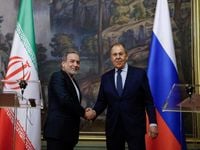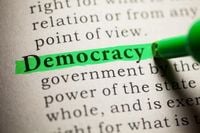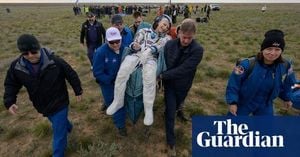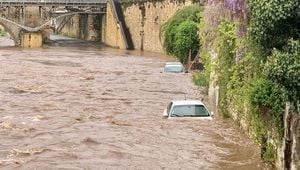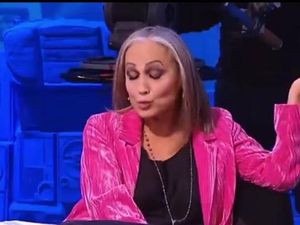Iran’s Foreign Minister Abbas Araghchi cast significant doubt on the intentions of the United States just a day before a crucial second round of nuclear talks set to take place in Rome. These discussions come after a week of high-level negotiations between the two nations, marking the first such interactions since former President Donald Trump unilaterally abandoned the landmark 2015 nuclear deal three years later. Since that time, Iran has abandoned all limits on its nuclear program, enriching uranium to a purity of up to 60 percent, dangerously close to weapons-grade levels of 90 percent.
During a news conference in Moscow with his Russian counterpart Sergey Lavrov, Araghchi stated, "Although we have serious doubts about the intentions and motivations of the American side, in any case, we will participate in tomorrow’s negotiations." He is set to depart for Rome on Saturday, April 19, 2025, for Omani-mediated talks with U.S. Middle East envoy Steve Witkoff.
Araghchi emphasized Iran's commitment to pursuing a peaceful resolution regarding its nuclear program, stating, "We are fully prepared to pursue a peaceful resolution for Iran’s peaceful nuclear programme." Lavrov indicated that Russia is willing to play a supportive role in the negotiations, saying, "Moscow is ready to play any role that will be useful from Iran’s point of view and that will be acceptable to the United States."
Despite these diplomatic overtures, a pervasive sense of mistrust looms over the talks. Al Jazeera’s Tohid Asadi reported from Tehran that there is a “cloud of mistrust in the air,” highlighting that Iranians are skeptical of the U.S. intentions. "There is this mistrust that exists pertaining to the United States, but going back to the statement that were heard today … we saw a mix of doubt and hope at the same time," Asadi noted. He added that Iran is not interested in discussing its nuclear capabilities in the negotiations.
In a recent statement, the Islamic Revolutionary Guard Corps reiterated that Iran’s military capabilities are off the table for discussion. The official IRNA news agency reported that Iran's regional influence and missile capabilities are among its “red lines” in the talks. On Wednesday, Araghchi responded to Witkoff's call for a halt to uranium enrichment by asserting that such matters are not up for negotiation. “If there is similar willingness on the other side, and they refrain from making unreasonable and unrealistic demands, I believe reaching an agreement is likely,” he said.
U.S. Secretary of State Marco Rubio remarked earlier on Friday that the U.S. administration is pursuing a peaceful solution with Iran but will not tolerate the country developing a nuclear weapon. Rubio met with officials from Britain, France, and Germany in Paris, urging them to maintain sanctions against Iran rather than allowing them to expire.
Meanwhile, Israel has reiterated its commitment to preventing Iran from obtaining nuclear weapons. Israeli Defence Minister Israel Katz stated, “Prime Minister Benjamin Netanyahu and I, along with all relevant bodies, are committed to leading a clear course of action that will prevent Iran from acquiring nuclear weapons.”
In a separate but related diplomatic effort, U.S. Vice President JD Vance met with Italy's Prime Minister Giorgia Meloni in Rome on the same day, April 18, 2025, to discuss tariffs and a potential ceasefire in Ukraine. Vance expressed optimism about the negotiations, stating he felt hopeful about bringing the ongoing war to a close.
Meloni, who shares conservative views with Vance and former President Trump, had met with Trump just a day prior in Washington as part of her charm offensive aimed at securing a U.S.-EU tariffs deal. Trump had previously imposed a 20 percent tariff on EU exports, which he has now suspended for 90 days. Vance emphasized the importance of discussing the ceasefire negotiations with Meloni, saying, “We have some interesting things to report on, of course in private.”
Vance's trip marks his first return to Europe since a combative speech at the Munich Security Conference in February, where he criticized EU members on cultural issues and called for the bloc to enhance its security measures. He is scheduled to attend Good Friday mass at St. Peter's Basilica later on Friday and will meet with Cardinal Pietro Parolin, the Vatican's secretary of state, on Saturday.
While Meloni has been a staunch ally of Ukraine, supporting President Volodymyr Zelensky since Russia's invasion in 2022, the topic of Ukraine remains sensitive between U.S. and Italian leaders. Meloni condemned Russia’s recent attacks on Ukraine, labeling them “horrible and vile.” However, Trump’s recent pivot towards Moscow and his critical remarks about Zelensky have raised eyebrows among allies. During a meeting with Meloni, Trump stated, “I don't hold Zelensky responsible but I'm not exactly thrilled with the fact that that war started,” reflecting a complicated relationship with the situation in Ukraine.
As the diplomatic landscape continues to shift, both the nuclear talks involving Iran and the discussions surrounding Ukraine highlight the intricate balance of international relations. The outcomes of these negotiations could have far-reaching implications, not only for the countries involved but also for global stability.
